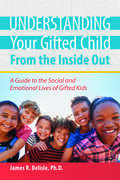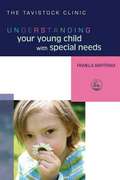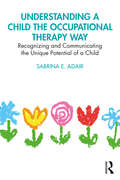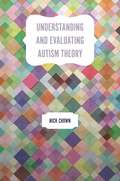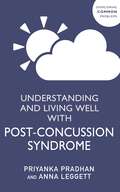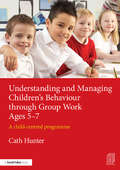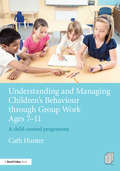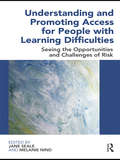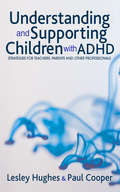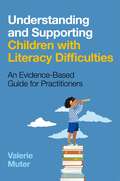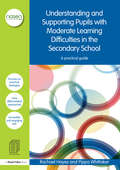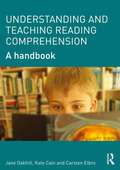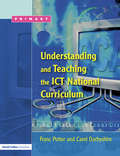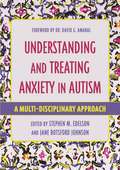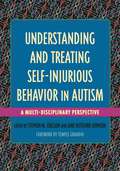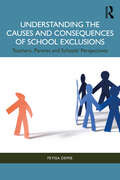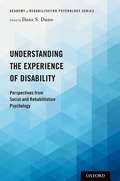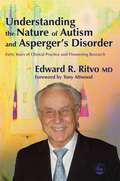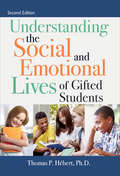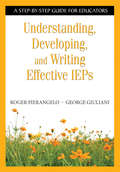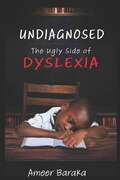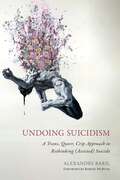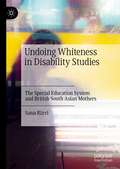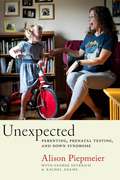- Table View
- List View
Understanding Your Gifted Child From the Inside Out
by James DelisleUnderstanding Your Gifted Child From the Inside Out provides an engaging and encouraging look at raising gifted children today. A follow-up to the best-selling "Parenting Gifted Kids: Tips for Raising Happy and Successful Children," this new edition focuses on the social and emotional aspects of giftedness, highlighting new information on the issues of perfectionism, self-advocacy, underachievement, mindfulness, and the impact of technology on gifted kids' relationships. The book also features a section on life beyond college, for those readers whose children are no longer children. Understanding Your Gifted Child From the Inside Out features real-life stories about the lives of gifted children and how they and their parents recognize and enjoy the many intellectual talents and social and emotional insights they possess.
Understanding Your Young Child With Special Needs
by Pamela BartramParenting children is always a challenging process, and parenting a young child with special needs presents extra challenges. This book offers an insight into how disability impacts on the normal stages of child development during the first five years. Placing the child and his or her personality, family life, feelings and behaviours at the centre of the book, Bartram addresses all the 'ordinary' challenges and tasks of parenting, such as sibling relationships, nursery and school, toilet training, and healthy aggression, as well as those that are of particular relevance to the parents of young children with special needs. This accessible book provides a wealth of information to help the parent of a young child with special needs, and is also of interest to professionals working with babies and pre-school children with special needs. Book jacket.
Understanding a Child the Occupational Therapy Way: Recognizing and Communicating the Unique Potential of a Child
by Sabrina E. AdairThis book uses an occupational therapy way of thinking to guide the reader towards observing, understanding, and communicating the needs of children to foster a supportive environment. Presented in accessible, everyday language, this book takes a holistic approach of looking at a child from what makes them a unique person, what activities they are trying to accomplish, and what environment they are in. Each chapter helps readers identify, describe, and clearly articulate a different aspect of the child’s environment and how it may affect them, the way that they process different sensory inputs, what their behaviors may be telling us, and how they learn. By recognizing each child’s unique story and effectively communicating their story to others, the reader can identify the most effective ways to support a child to meet a child’s needs and set them up for success. Therapists, educators, parents, and childcare workers will all benefit from the simple strategies outlined in this book to enrich a child’s learning.
Understanding and Evaluating Autism Theory
by Nick ChownAddressing the full spectrum of theoretical output associated with autism and Asperger syndrome, this is the complete guide to autism theory - spanning from mainstream and alternative, through to non-autism specific theories that might be applied to autism. Previous study on autism has made significant inroads into the individual branches of autism theory, however, no text has brought together the complete range of theories in an accessible textbook for students and academics. The author argues that a more obvious application of theory to autism intervention would be beneficial to practitioners. With access to the complete range of available autism and Asperger syndrome theory, from development theories to learning style theories, the academics and students working towards the practical application of theory to intervention will have all the necessary information at their disposal. The book is based on a series of autism theory lectures delivered for the NAS and Sheffield Hallam University.
Understanding and Living Well With Post-Concussion Syndrome
by Priyanka Pradhan Anna LeggettConcussion, even in its mildest form, can have lasting effects on the individual in a way we're only just beginning to understand. Mild Traumatic Brain Injuries (mTBI), concussion and post-concussion syndrome have previously been conservatively managed with recommendations for 'rest'. But even mild brain injuries and post-concussion syndrome can have an enormous impact on life, long after the 3 months during which they are expected to resolve. There are also significant differences between the way in which concussion affects men and women respectively, as this new research shows. If concussion or an mTBI are affecting you, there is much in this book to help and support your symptoms. Neuropsychologist Dr Priyanka Pradhan has pulled together the latest research to provide a complete manual for overcoming the impact of any mild brain injury, while writer and coach Anna Leggett gives deep insight from her own experiences with post-concussion syndrome. Their book not only explains what a concussion is and how it may present, but also gives comprehensive practical strategies for managing persistent symptoms. Such strategies include how to ask for professional and specialist medical help (and where to get it from), and also self-management techniques that draw on things like EMDR, craniosacral therapy and osteopathy. Understanding and Living Well with Post-Concussion Syndrome also explains the importance of sleep and diet, and includes significant psychological and emotional support for mental wellbeing and recovery, a support that is often missing from the clinical pathway for post-concussion syndrome. This book is an essential resource for anyone who feels that they need insight, practical help and emotional support into what is often perceived as an almost-invisible illness, but one which is very real for you or your loved one.
Understanding and Living Well With Post-Concussion Syndrome
by Priyanka Pradhan Anna LeggettConcussion, even in its mildest form, can have lasting effects on the individual in a way we're only just beginning to understand. Mild Traumatic Brain Injuries (mTBI), concussion and post-concussion syndrome have previously been conservatively managed with recommendations for 'rest'. But even mild brain injuries and post-concussion syndrome can have an enormous impact on life, long after the 3 months during which they are expected to resolve. There are also significant differences between the way in which concussion affects men and women respectively, as this new research shows. If concussion or an mTBI are affecting you, there is much in this book to help and support your symptoms. Neuropsychologist Dr Priyanka Pradhan has pulled together the latest research to provide a complete manual for overcoming the impact of any mild brain injury, while writer and coach Anna Leggett gives deep insight from her own experiences with post-concussion syndrome. Their book not only explains what a concussion is and how it may present, but also gives comprehensive practical strategies for managing persistent symptoms. Such strategies include how to ask for professional and specialist medical help (and where to get it from), and also self-management techniques that draw on things like EMDR, craniosacral therapy and osteopathy. Understanding and Living Well with Post-Concussion Syndrome also explains the importance of sleep and diet, and includes significant psychological and emotional support for mental wellbeing and recovery, a support that is often missing from the clinical pathway for post-concussion syndrome. This book is an essential resource for anyone who feels that they need insight, practical help and emotional support into what is often perceived as an almost-invisible illness, but one which is very real for you or your loved one.
Understanding and Managing Children's Behaviour through Group Work Ages 5-7: A child-centred programme
by Cath HunterUnderstanding and Managing Children’s Behaviour 5-7 provides the reader with an insight into children’s emotional well-being and helps them to understand what and how children communicate and how to respond in a way that provides positive messages, increases their emotional vocabulary and encourages them to change their behaviour. It provides an alternative and effective child-centred way of managing children’s behaviour through introducing the concept of reflective language and other tools, equipping staff with new skills that are transferable across the school in any role. The book is divided into two sections, enabling the reader to link theory with practice. The first section takes the reader on a journey to help them understand the different factors that influence children’s behaviour. The second section of the book focuses on the group work programmes, how they can be used, their value and the impact they can have on children and the school as a whole. The activities in the group work programmes explore the concept of using reflective language as a behaviour management tool and are designed to motivate and build confidence, self-esteem and resilience. Useful pedagogical features throughout the book include: practitioner and classroom management tips and reflective tasks; strategies and practical ideas for staff to use to help them engage more deeply with the contents of the book; flexible, tried and tested group work programmes designed to promote inclusion rather than exclusion; clear step-by-step instructions for delivering the group work programmes; case studies showing behaviour examples with detailed explanations for the behaviour and strategies to respond to it. This book is aimed at all KS1 primary school staff, especially teaching assistants, learning mentors and family workers who can deliver the group work programmes. It is also recommended reading for SENCOs and trainee teachers, and will be useful for therapists who work with children and are looking at delivering other approaches in their work.
Understanding and Managing Children's Behaviour through Group Work Ages 7 - 11: A child-centred programme
by Cath Hunter'I would highly recommend the skills, expertise and delivery that Cath can bring to a school and can guarantee that any school following her advice will not regret it.' Carl McIver, Head of School, St. Willibrord's R.C. Primary, Manchester 'I have worked with Cath Hunter now in two schools and find that the work she does with children, parents and staff is amazing.' Sam Foord, Headteacher, Ravensbury Community School, Manchester Understanding and Managing Children’s Behaviour provides the reader with an insight into children’s emotional wellbeing and helps them to understand what and how children communicate and how to respond in a way that provides positive messages, increases their emotional vocabulary and encourages them to change their behaviour. It provides an alternative and effective child centred way of managing children’s behaviour through introducing the concept of reflective language and other tools, equipping staff with new skills that are transferable across the school in any role. The book is divided into two sections, enabling the reader to link theory with practice. The first section takes the reader on a journey to help them understand the different factors that influence children’s behaviour. The second section of the book focuses on the group work programmes, how they can be used, their value and the impact they can have on children and the school as a whole. The activities in the group work programme explore the concept of using reflective language as a behaviour management tool and are designed to motivate, build confidence, self-esteem and resilience. Useful pedagogical features throughout the book include:- Practitioner and classroom management tips and reflective tasks; Strategies and practical ideas for staff to use to help them engage more deeply with the contents of the book; Flexible, tried and tested group work programmes designed to promote inclusion rather than exclusion; Clear step by step instructions for delivering the work programmes; Case studies showing behaviour examples with detailed explanations for the behaviour and strategies to respond to it. The book is aimed at all primary school staff, especially teaching assistants, learning mentors and family workers who can deliver the group work programmes. It is also recommended reading for SENCOs and trainee teachers and will also be useful for therapists who work with children and are looking at delivering other approaches in their work.
Understanding and Promoting Access for People with Learning Difficulties: Seeing the Opportunities and Challenges of Risk
by Melanie Nind Jane SealeThe issue of access is at the forefront of the practical challenges facing people with learning difficulties and people working with or supporting them. This engaging text brings together evidence, narratives and discussions that question and advance our understanding of the concept of access for people with learning difficulties. Seale and Nind draw on their expertise to analyse a wide range of situations, including access to public spaces, citizenship education, community participation, and employment. Through a series of related chapters, key researchers in the field of inclusion and learning difficulties enrich the access debate by: considering what kind of access people with learning difficulties want; identifying effective practice in relation to facilitating and promoting access; revealing the capability of people with learning difficulties to seek and achieve access to potentially exclusionary communities; providing a space for a wide range of people to share access stories. With contributions from a variety of stakeholders including people with learning difficulties, Understanding and Promoting Access for People with Learning Difficulties clarifies the concept of access without over-simplifying what is involved. Through rigorous critique, this book provides a unique rationale for a new multi-dimensional model of access and ways of promoting it. Proposing a reconceptualisation of the risk associated with promoting access for people with learning difficulties, this book will be of immense interest to students, researchers and professionals involved in inclusion and disability issues.
Understanding and Supporting Children with ADHD: Strategies for Teachers, Parents and Other Professionals
by Lesley A Hughes Paul W Cooper′This book provides a succinct overview of issues relevant to understanding and supporting pupils with ADHD. It is well written and includes authentic case studies... The real strength of the book is in its careful consideration of how collaborative working can enable youngsters with an ADHD diagnosis to get the best out of their education. Ideas outlined are practical but are also based on careful thinking about effective models and approaches to intervention... an excellent starting point for anyone embarking on research related to educational provision for pupils with ADHD′ - SENCO Update ′In many ways this publication reads like a toolkit, and as such offers a range of practices that may be considered in order to improve outcomes for all. A readable and supportive book′ - SNIP Children with Attention Deficit Hyperactivity Disorder (ADHD) can be hard to include in a mainstream classroom, and managing their behaviour is often a challenge. Drawing directly from real classroom experience, this book shows how to use effective management strategies to improve behaviour in the classroom and at home. This interdisciplinary approach will provide teachers with: " strategies to deal with disruptive behaviours " ways to channel children′s positive characteristics " advice on how teachers can support and guide parents " behaviour management techniques to promote positive behaviour " advice on collaborative working, and how teachers can build partnerships with other professionals.
Understanding and Supporting Children with Literacy Difficulties: An Evidence-Based Guide for Practitioners
by Valerie MuterLearning to read is arguably the single most important educational challenge a child faces in the first years of schooling, setting a child up for future academic success and opportunities. However, it is estimated that one in six children experience literacy difficulties. This is the go-to book for psychologists, educationalists and other professionals wanting a deeper understanding of current thinking around dyslexia, reading comprehension difficulties, and related SpLDs. Drawing on six fictional case studies to illustrate her points, and using examples of good practice throughout, Valerie Muter unpacks the latest psychological theories and research on literacy disorders. She discusses the interconnections between underlying cognitive problems and learning and educational and behavioural issues, as well as the common co-occurrence of these conditions. This authoritative book also provides accessible guidance on making assessments and tailoring interventions within the home or school.Written by a lead thinker in the field, this is an essential evidence-based guide for those working with children with literacy difficulties and supporting them to achieve their full potential.
Understanding and Supporting Pupils with Moderate Learning Difficulties in the Secondary School: A practical guide (nasen spotlight)
by Rachael Hayes Pippa WhittakerAre you working with students who have Moderate Learning Difficulties? Do you want to know how best to help them? Are you confused about what helps and what hinders? Learners with MLD form one of the largest categories of special educational need in mainstream secondary schools. In most schools, the vast majority of learners with MLD will be taught in mainstream classes much of the time. This book outlines a range of strategies and approaches for supporting these learners. It includes all the vital information practitioners need to know about Moderate Learning Difficulties. Key points covered include: Definitions and identification of moderate learning difficulties Teaching strategies and approaches Developing key conceptual, literacy and social skills Effective support from TAs Theoretical perspectives on learning Understanding and Supporting Pupils with Moderate Learning Difficulties in the Secondary School provides an introduction to a wide range of ideas, arguments and perspectives about ways of understanding and supporting learners who are considered to have MLD. This is a much-needed source of knowledge for teachers, TAs, SENCos, Learning Mentors and anyone who supports children and young people with moderate learning difficulties and provides an honest and accessible approach.
Understanding and Teaching Reading Comprehension: A handbook
by Jane Oakhill Kate Cain Carsten ElbroThe ultimate aim of reading is not the process but to understand what we read and comprehension can take place at many different levels. There has been an increasing emphasis on the importance of reading comprehension in recent years but despite this there is very little written on this vital topic accessible to trainee and practicing teachers. The Handbook of Reading Comprehension presents an overview of recent findings on reading comprehension and comprehension problems in children. It provides a detailed examination of the characteristics of children who have reading comprehension difficulties, and examines ways in which comprehension can be supported and improved. It is accessibly written for students and professionals with no previous background in the psychology of reading or reading problems. This indispensable handbook asks the question ‘what is comprehension?’ The authors consider comprehension of different units of language: understanding single words, sentences, and connected prose and outline what readers (and listeners) have to do to successfully understand an extended text. This book also considers comprehension for different purposes, in particular reading for pleasure and reading to learn and explores how reader characteristics such as interest and motivation can influence the comprehension process. Different skills contribute to successful reading comprehension. These include word reading ability, vocabulary knowledge, syntactic skills, memory, and discourse level skills such as the ability to make inferences, knowledge about text structure, and metacognitive skills. The authors discuss how each one contributes to the development of reading comprehension skill and how the development of these skills (or their precursors) in pre-readers, provides the foundation for reading comprehension development. Areas covered include:- Word reading and comprehension Development of comprehension skills Comprehension difficulties Assessment Teaching for improvement Throughout the text successful experimental and classroom based interventions will be highlighted, practical tips for teachers and summary boxes detailing key points and explaining technical terms will be included in each chapter
Understanding and Teaching the ICT National Curriculum
by Franc PotterThere is still great uncertainty in the teaching profession regarding the effective delivery of ICT. This introductory book provides both trainee and practising teachers with a clear understanding of the ICT National Curriculum and how to teach it. Combining extensive practical advice with a critical discussion of the key theoretical issues, the book will help teachers develop their pupil's true ICT capability through clear explanations of the Programmes of Study, full guidance on using QCA Scheme of Work, different and creative ideas for delivering the ICT National Curriculum, and the confidence and ability to go beyond the QCA Sceme of Work for ICT.
Understanding and Treating Anxiety in Autism: A Multi-Disciplinary Approach
by Stephen M. Edelson and Jane Botsford JohnsonAnxiety is a prevalent and often debilitating condition for individuals on the autism spectrum. This book promotes a multidisciplinary approach to intervention and treatment of the condition, providing professional understanding of the underlying causes and available treatments. With chapters co-authored by well-known advocates and pioneering researchers, contributors examine factors including sensory processing issues, sleep impairments and the crossover between the autonomic nervous system and immune system. The book expands upon current areas of research, including immune activation and the role of environmental toxicants, dietary and nutritional support, the treatment of gastrointestinal disorders and individualised methods of managing stress and anxiety. Providing an invaluable resource for professionals and academics seeking further insight into anxiety and autism, this book explores contemporary research and sets the groundwork for the most effective methods of treatment for individuals of all ages.
Understanding and Treating Self-Injurious Behavior in Autism: A Multi-Disciplinary Perspective
by Temple Grandin John Green Nancy O'Hara Manuel F. Casanova Lucy Jane Miller Margaret L. Bauman V. Mark Durand June Groden Cooper R. Woodard Harumi Jyonouchi Paul Millard Hardy Stephen M. Edelson Kelly Mccracken Barnhill Mary Coleman Emily L. Casanova Karen Misher Leslie Weidenman Jane Botsford Johnson Lauren J. Moskowitz Jamie D. Bleiweiss Alexis B. Ritter Caitlin E. WalshSelf-injurious behavior occurs in almost half of those with autism and is one of the most devastating and challenging-to-treat behaviors. There are many different forms of self-injury, such as head banging, hand biting, hair pulling, excessive scratching, and much more. With contributions from the leading experts in research and treatment, the book provides a comprehensive analysis of self-injurious behavior (SIB) in people with Autism Spectrum Disorder (ASD) or related developmental disabilities, and the different methods available to treat them. Medical and behavioral researchers have studied SIB for over 50 years, but many practitioners and parents are still unfamiliar with the wide range of contributing causes and treatment options. Beginning with an explanation of SIB and its various forms, the contributors outline the many possible underlying causes of self-injury, such as seizures, hormonal imbalance in teenagers, gastrointestinal conditions, allergies, and stress, and show how a multi-disciplinary approach when uncovering the causes of self-injury can lead to successful treatment strategies. They explain the treatment options available for SIB, including nutritional, medical, psychiatric, sensory, and behavioral approaches, and show how an integrative approach to treating self-injury may be effective for many individuals. The book will be an invaluable addition to the bookshelves of any practitioner working with people with an ASD or related condition, as well as parents and direct care providers.
Understanding the Causes and Consequences of School Exclusions: Teachers, Parents and Schools' Perspectives
by Feyisa DemieThis book outlines a study of the causes and consequences of school exclusions. It explores the experiences of schools, teachers, parents, and governors and includes a focus on the experience of Black and minority ethnic students and those with special educational needs and disabilities. The book presents the results of detailed empirical research from English schools that studied teachers, school leaders, parents, governors, educational psychologists, and school staff experience with school exclusions. The book examines the scale of the problem and underlying factors, the disproportionality of exclusions for SEND and minority ethnic students, comparative international literature on exclusions and implications for policy, practice, and research. Providing a comprehensive overview of the factors affecting school exclusions, the book will be of great interest to researchers, academics, and students in the areas of education policy, inclusion and special education needs in education. It will also be of interest to policy makers and education professionals including special educational needs co-ordinators and headteachers.
Understanding the Experience of Disability: Perspectives from Social and Rehabilitation Psychology
by Dana S. DunnRehabilitation psychologists have long argued that situational constraints (e.g., missing ramps, lack of Braille signage, nondisabled peoples' attitudes) create greater social barriers and behavioral restrictions for people with disabilities (PWDs) than do the disabilities themselves. In other words, as social psychologist Kurt Lewin argued, situational factors, including the perceptions and actions of other people, often have greater impact on the experience of disability than do the personal qualities of PWDs themselves. Thus, the experience of disability is shaped by a variety of psychosocial forces and factors, some of which enhance while others hinder daily living. For adequate understanding and to plan constructive interventions, psychological science must attend to how the disabled person and the situation interact with one another. <P><P>Understanding the Experience of Disability: Perspectives from Social and Rehabilitation Psychology is an edited book containing chapters written by social and rehabilitation psychologists who study how social psychological theory can inform our understanding of the experience of disability and rehabilitation. Chapters are arranged topically into four sections: Established areas of inquiry (e.g., stigma, social biases, stereotyping), mainstream topics (e.g., women, culture and race, aging), emerging issues (e.g., implicit attitudes, family and parenting issues, positive psychology), and issues of injustice, advocacy, and social policy (e.g., perceived injustice, disability advocacy, policy implications). Besides informing advanced undergraduate and graduate students and professional (researchers, practitioners) audiences, the book will help families and caregivers of PWDs, policy makers, and PWDs themselves, understand the social psychological processes linked to disability.
Understanding the Nature of Autism and Asperger's Disorder: Forty Years of Clinical Practice and Pioneering Research
by Anthony Attwood Edward R RitvoEdward R. Ritvo md is an internationally recognized medical expert, researcher and pioneer in the field of autism and Asperger's disorder and co-author of the official diagnostic criteria in the DSM (Diagnostic and Statistical Manual of Mental Disorders). Much of what is known about these disorders today is based on his painstaking research and groundbreaking discoveries. In this book he shares his forty years' experience and opens his extensive UCLA casebook to the reader. Understanding the Nature of Autism and Asperger's Disorder is 'a consultation with Prof. Ritvo' - a thoroughly accessible introduction for professionals, families, spouses and individuals with autism and Asperger's Disorder. Prof. Ritvo traces the historical development of understanding about autism and Asperger's Disorder, from the centuries of misdiagnoses and the first recognition of the characteristics of the disorders to his own highly-regarded methods for making a diagnosis. Drawing on case histories from forty years' of clinical practice, he explains their basic nature, what the causes are, what is different in the brain, treatments that work (and those that don't), what a child with a diagnosis might be like when he or she grows up, and what future research may hold. This book will be an absolute must-read for anyone with an interest in autism and Asperger's Disorder, whether a practitioner, a parent, a student, or an affected individual.
Understanding the Social and Emotional Lives of Gifted Students, 2nd ed.
by Thomas HebertThe second edition of Understanding the Social and Emotional Lives of Gifted Students presents a comprehensive treatment of social and emotional development in high-ability learners. This text:Discusses theories that guide the examination of the lived experiences of gifted students.Features new topics, such as cyberbullying and microagressions. Covers social and emotional characteristics and behaviors evidenced in gifted learners.Includes considerations for gifted underachievers, gifted culturally diverse students, twice-exceptional students, GLBTQ gifted students, and young people from low-income backgrounds.Describes gifted students friendships and family relationships that support them, contextual influences that shape their social and emotional lives, and identity development.The author provides a wealth of field-tested strategies for addressing social and emotional development. In addition, the book offers a plan for designing a gifted-friendly classroom environment to support the social and emotional well-being of gifted students and a comprehensive collection of resources to support professionals in gifted education research and practice.
Understanding, Developing, and Writing Effective IEPs: A Step-by-Step Guide for Educators
by Roger Pierangelo George A. GiulianiWritten by legal and education experts and aligned with the reauthorization of IDEA 2004, this practical resource provides a step-by-step plan for creating, writing, and evaluating IEPs.
Undiagnosed: The Ugly Side of Dyslexia
by Ameer BarakaIn UNDIAGNOSED, The Ugly Side of Dyslexia, Emmy nominated actor Ameer Baraka depicts how coming of age in the murderous streets of 1980s New Orleans collided with an unrecognized learning difference. Incarcerated for manslaughter at the age of fourteen, Ameer must reconcile his past with the will to persevere through the misconception that he's unable to learn. At age twenty-three, Ameer re-enters the prison system, where he reclaims an education denied to so many who struggle to read. His rage transforms into determination to help other inmates and young people recognize that through perseverance and education, there is an alternative to living a life of crime and a method to dismantle the school-to-prison pipeline. Stories speak louder than statistics, and in this tale of redemption, the good we do is measured by what we've overcome and the lives we inspire after discovering our truth. Ameer Baraka is an award-winning and Daytime Emmy Nominated Actor, author, dyslexia advocate, youth mentor, and prison coach. Born to humble beginnings in New Orleans, Ameer's early life was as gloomy and as ill-fated as a young life could have been. In and out of the prison system as a kid for transgressions ranging from youthful indiscretions to major crimes, he was seemingly on a one-way trip to oblivion. Almost illiterate when he went to prison, he was diagnosed with dyslexia and learned to read in his mid-twenties while behind bars. Seeing how education and ability to read have changed his life, Ameer is dedicated to inspiring young people with his message that they, too, can overcome meager beginnings and obstacles in their way to eventually triumph through hard work, dedication, strong faith, and the pursuit of education.
Undoing Suicidism: A Trans, Queer, Crip Approach to Rethinking (Assisted) Suicide
by Alexandre BarilIn Undoing Suicidism, Alexandre Baril argues that suicidal people are oppressed by what he calls structural suicidism, a hidden oppression that, until now, has been unnamed and under-theorized. Each year, suicidism and its preventionist script and strategies reproduce violence and cause additional harm and death among suicidal people through forms of criminalization, incarceration, discrimination, stigmatization, and pathologization. This is particularly true for marginalized groups experiencing multiple oppressions, including queer, trans, disabled, or Mad people. Undoing Suicidism questions the belief that the best way to help suicidal people is through the logic of prevention. Alexandre Baril presents the thought-provoking argument that supporting assisted suicide for suicidal people could better prevent unnecessary deaths. Offering a new queercrip model of (assisted) suicide, he invites us to imagine what could happen if we started thinking about (assisted) suicide from an anti-suicidist and intersectional framework. Baril provides a radical reconceptualization of (assisted) suicide and invaluable reflections for academics, activists, practitioners, and policymakers.
Undoing Whiteness in Disability Studies: The Special Education System and British South Asian Mothers
by Sana RizviThis book offers a nuanced way to conceptualise South Asian Muslim families’ experiences of disability within the UK. The book adopts an intersectional lens to engage with personal narratives on mothering disabled children, negotiating home-school relationships, and developing familiarity with the complex special education system. The author calls for a re-envisioning of special education and disability studies literature from its currently overwhelmingly White middle-class discourse, to one that espouses multi-ethnic and multi-faith perspectives. The book positions minoritised mothers at the forefront of the home-school relationship, who navigate the UK special education system amidst intersecting social inequalities. The author proposes that schools and both formal and informal institutions reformulate their roles in facilitating true inclusion for minoritised disabled families at an epistemic and systemic level.
Unexpected: Parenting, Prenatal Testing, and Down Syndrome
by Alison PiepmeierWhat prenatal tests and down syndrome reveal about our reproductive choicesWhen Alison Piepmeier—scholar of feminism and disability studies, and mother of Maybelle, an eight-year-old girl with Down syndrome—died of cancer in August 2016, she left behind an important unfinished manuscript about motherhood, prenatal testing, and disability. In Unexpected, George Estreich and Rachel Adams pick up where she left off, honoring the important research of their friend and colleague, as well as adding new perspectives to her work.Based on interviews with parents of children with Down syndrome, as well as women who terminated their pregnancies because their fetus was identified as having the condition, Unexpected paints an intimate, nuanced picture of reproductive choice in today’s world. Piepmeier takes us inside her own daughter’s life, showing how Down syndrome is misunderstood, stigmatized, and condemned, particularly in the context of prenatal testing.At a time when medical technology is rapidly advancing, Unexpected provides a much-needed perspective on our complex, and frequently troubling, understanding of Down syndrome.
